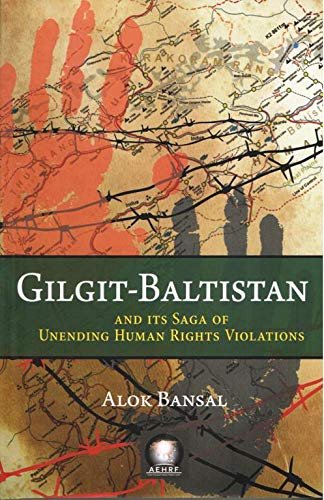Author: Alok Bansal
Publisher: Pentagon Press, 2018, pp. 258
Price: Rs.795/-
Book Review by:Aayushi Ketkar*
Gilgit-Baltistan and its Saga of Unending Human Rights Violations is a book on a region that the Parliament of India calls as an ‘inalienable part of India’ but which has been under the occupation of Pakistan for the last 70 years.This exotic ‘crown of India’ has been out of national consciousness since Independence so much so that the present generation, ‘Gen Y’ as it likes to be called, is completely oblivious of its existence and importance.
The author, Capt Alok Bansal, a former defence personnel with a distinguished career, has dedicated more than a decade in studying this region minutely, and understanding all its intricacies and finer nuances, in order to press upon the national security establishment and the academia, in bringing back the focus on this strategically important region, which is home to some of the largest peaks, glaciers and fresh water reservoirs in the world apart from a vast bounty of mineral resources comprising of precious stones like emerald, ruby, topaz, heavy metal like gold, copper, mica, lead, iron, and uranium reserves too.
Surrounded by Xinjiang province of China, Wakhan Corridor of Afghanistan, Chitral & Kohistan Districts of Pakistan and stone’s throw from Central Asia, Gilgit-Baltistan has attracted the attention and interest of great powers for its geo-strategic location, which is of critical importance in controlling the world (Heartland theory). Gilgit-Baltistan has been an integral part of the ancient Silk Route and the modern re-creation of the same by China, through its ambitious Belt and Road Initiative (BRI). Thus this 73,000 sq. km region is important for more reasons than one, making it the cynosure of all and sundry, except its lawful owner, India, until recently. It was PM Modi’s mention of this region from the rampart of the Red Fort, in his Independence Day speech of 2015 that triggered a sense of curiosity in the people and policy makers of India. That curiosity can be quenched to a large extent by this book as it touches upon all important aspects of this region in good measure ranging from its pre-Islamic history, culture and tradition to the current spate of externally-imposed demographic changes, violent ethnic strifes and the blatant violations of human rights of its people.
The book demolishes all myths and fake narratives created by vested interests like Gilgit-Baltistan not being a part of J&K till the arrival of the British. The author with the help of empirical data, legal documents and archaeological evidence, proves conclusively that Gilgit-Baltistan had strong historical, trade and genetic links with rest of India in general and Jammu and Kashmir in particular, since times immemorial. Balti, the primary language of Baltistan, is spoken in Ladakh even today. Capt Bansal’s in-depth research proves beyond doubt that not only Ladakh but J&K and the rest of India were engaged constructively with this region through the ages, making it seamlessly and naturally an ‘integral part of India’ till the arrival of the British on the scene. British scared by the growing Russian presence in Central Asia and under the ‘Great Game’, amputed part of this region artificially with the clear intent of maintaining suzerainty over this strategically important region, to halt the Eastward march of Czarist Russia first and the Communist Red Army later.
A major portion of this book is dedicated to mirroring the hapless state of the indigenous people residing in this region, who have been reduced to a minority in seven decades of inhumane Pakistani rule. The blatant human rights violations done through instruments like the archaic Frontier Crimes Regulation (FCR), originally promulgated by the British but insidiously continued by Pakistani authorities to this day, aggravates the situation by prescribing collective punishment to the residents of Gilgit-Baltistan, giving no scope for dissent of any kind. Even voicing genuine grievances is treated as a ‘crime’ incurring heavy penalty, deterring people from doing so and forcing them to lead wretched lives. As if this was not enough, Gilgit-Baltistan has been burning in an unending cycle of sectarian violence ever since President Zia-ul-Haq introduced Sunni Deobandi Islam in the region, which has historically been a Shia stronghold.
As rightly stated in the introduction of this book the ignorance of national security issues is a ‘curse that nations and its people will pay for heavily’ resonates long past the physical usurpation of this strategically and resource-rich region. The burden of not paying heed to the loss of this region during the Nehruvian era and failing to take all necessary actions in reclaiming it back, is haunting us today as China in the guise of developing its so-called ‘friend and ally’, Pakistan, is investing heavily in this region through its multi-billion dollar project, China-Pakistan Economic Corridor (CPEC).
This book undoubtedly unveils the veil of ignorance about this region and brings it back to the centre stage of national security discourse, which was long due and desperately needed. For doing this successfully, the author, should be commended.
*Aayushi Ketkar is a faculty of international relations at Gautam Buddha University, Greater Noida.
(This Book Review is carried in the print edition of November-December 2018 issue of India Foundation Journal.)



